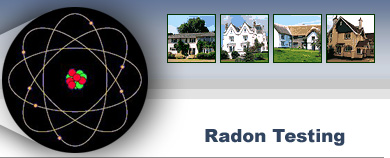|
|
What is Radon?
Radon is a naturally occurring cancer-causing radioactive gas that can be found all over the United States. You can't see it, taste it or smell it. Radon comes from the natural radioactive breakdown of uranium in soil, rock and water and gets into the air that you breathe. It is estimated that radon causes thousands of deaths each year. The Surgeon General has warned that radon is the second leading cause of lung cancer in the United States today, second only to smoking. If you smoke and your home has high radon levels, your risk of lung cancer is considerably higher.
Should I test for radon?
YES! The only way to know if you and your family are at risk from radon is by having a radon test performed by a licensed professional. Radon can get into any type of building and build up to high levels but you and your family are most likely to get your greatest exposure at home because that is where you spend most of your time.
Can high levels of radon be reduced?
YES! The EPA recommends that you take action to reduce your home's indoor radon levels if your radon test results are 4 pCi/L or higher. You can do this by having a Sub-Slab Depressurization System installed by a licensed mitigation professional in your home.
Does Radon cause Cancer?
YES! Radon is a Class A known human carcinogen. If inhaled, radon decay products (polonium-218 and polonium-214, solid form), attach to the surface of aerosols, dusts, and smoke particles, become deeply lodged or trapped in the lungs, where they can radiate and penetrate the cells of mucous membranes, bronchi, and other pulmonary tissues. The ionizing radiation energy affecting the bronchial epithelial cells is believed to initiate the process of carcinogenesis. Although radon-related lung cancers are mainly seen in the upper airways, radon increases the incidence of all histological types of lung cancer, including small cell carcinoma, adenocarcinoma, and squamous cell carcinoma. Lung cancer, due to inhalation of radon decay products constitutes the only known risk associated with radon. The use of tobacco significantly increases the risk of lung cancer.
|
 |







